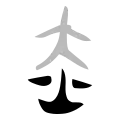| 火 | ||
|---|---|---|
| ||
| 火 (U+706B) "fire" | ||
| Pronunciations | ||
| Pinyin: | huǒ | |
| Bopomofo: | ㄏㄨㄛˇ | |
| Gwoyeu Romatzyh: | huoo | |
| Wade–Giles: | huo3 | |
| Cantonese Yale: | fó | |
| Jyutping: | fo2 | |
| Pe̍h-ōe-jī: | hó͘ⁿ | |
| Japanese Kana: | カ ka コ ko (on'yomi) ひ hi (kun'yomi) | |
| Sino-Korean: | 화 hwa | |
| Names | ||
| Chinese name(s): | (Left) 火字旁 huǒzìpáng (灬) 四點底/四点底 sìdiǎndǐ | |
| Japanese name(s): | 火/ひ hi (Left) 火偏/ひへん hihen れんが renga (灬) 烈火/れっか rekka | |
| Hangul: | 불 bul | |
| Stroke order animation | ||
 | ||
Radical 86 or radical fire (火部) meaning "fire" is one of the 34 Kangxi radicals (214 radicals in total) composed of 4 strokes.
In the Kangxi Dictionary, there are 639 characters (out of 49,030) to be found under this radical.
In the Chinese wuxing ("Five Phases"), 火 represents the element Fire. In Taoist cosmology, 火 (Fire) is the nature component of the Ba gua diagram 離 Lí.
火 is also the 95th indexing component in the Table of Indexing Chinese Character Components predominantly adopted by Simplified Chinese dictionaries published in mainland China, with 灬 being its associated indexing component.
Evolution
 Oracle bone script character
Oracle bone script character Bronze script character
Bronze script character Large seal script character
Large seal script character Small seal script character
Small seal script character
Derived characters
| Strokes | Characters |
|---|---|
| +0 | 火 灬 |
| +1 | 灭SC (=滅 -> 水) |
| +2 | 灮 灯SC/JP (=燈) 灰SC/TC/灰JP 灱 灲 灳 |
| +3 | 灴 灵SC (=靈 -> 雨) 灶 灷 灸 灹 灺 灻 灼 災 灾SC/TC variant (=災) 灿SC (=燦) 炀SC (=煬) |
| +4 | 炁 (=氣 -> 气) 炂 炃 炄 炅 炆 炇 炈 炉SC/炉JP (=爐) 炊 炋 炌 炍 炎 炏 炐 炑 炒 炓 炔 炕 炖 炗 (=光 -> 儿) 炘 炙 炚 炛 (=光) 炜SC (=煒) 炝SC (=熗) 炞 |
| +5 | 炟 炠 炡 炢 炣 炤 炥 炦 炧 炨 炩 炪 炫 炬 炭SC/TC/炭JP 炮 炯 炰 炱 炲 (=炱) 炳 炴 炵 炶 炷 炸 点SC/JP (=點 -> 黑) 為 炻 炼SC (=煉) 炽SC (=熾) 炾 炿 (=烐) 烀 烁SC (=爍) 烂SC (=爛) 烃SC (=烴) |
| +6 | 烄 烅 烆 烇 烈 烉 (=煥) 烊 烋 烌 烍 烎 烏 烐 烑 烒 烓 烔 烕 烖 烗 烘 烙 烚 烛SC (=燭) 烜 烝 烞 烟 (=煙) 烠 烡 (=光) 烢 烣 烤 烥 (=炬) 烦SC (=煩) 烧SC (=燒) 烨SC (=燁) 烩SC (=燴) 烪 烫SC (=燙) 烬SC (=燼) 热SC (=熱) 烮 (=烈) 焒SC variant |
| +7 | 烯 烰 烱 烲 烳 烴 烵 烶 烷 烸 烹 烺 烻 烼 烽 烾 烿 焀 焁 焂 焃 焄 焅 焆 焇 焈 焉 焊 焋 焌 焍 焎 焏 焐 焑 焒TC variant 焓 焔JP (=焰) 焕SC (=煥) 焖SC (=燜) 焗 焘SC (=燾) 焫SC variant |
| +8 | 焙 焚 焛 焜 焝 焞 焟 焠 無 焢 焣 焤 焥 焦 焧 焨 焩 焪 焫TC variant 焬 焭 焮 焯 焰 焱 焲 焳 焴 焵 然 焷 焸 焹 焺 焻 焼JP (=燒) 焽 焾 焿 煀 煁 煂 煃 煄 煅 煈 煉 煜 煮 煐SC variant |
| +9 | 煆 煇 煊 煋 煌 煍 煎 煏 煐TC variant 煑 (=煮) 煒 煓 煔 煕 (=熙) 煖 煗 煘 煙 煚 煝 煞 煟 煠 煡 煢 煣 煤 煥 煦 照 煨 煩 煪 煫 煬 煭 煯 煰 煱 煲 煳 煴SC/HK (=熅) 煵 煶 煷 煸 煺SC variant 熙 熍SC variant |
| +10 | 煺TC variant 煹 煻 煼 煽 煾 煿 熀 熁 熂 熃 熄 熅 熆 熇 熈 (=熙) 熉 熊 熋 熌 熍TC variant 熎 熏 熐 熑 熒 熓 熔 熕 熖 熗 熘 燁GB TC variant |
| +11 | 熚 熛 熜 熝 熞 熟 熠 熡 熢 熣 熤 熥 熦 熧 熨 熩 熪 熫 熬 熭 熮 熯 熰 熱 熲 熳 熴 熵 熿SC variant |
| +12 | 熶 熷 熸 熹 熺 熻 熼 熽 熾 熿TC variant 燀 燁Traditional variant 燂 燃 燄 (=焰) 燅 燆 燇 燈 燉 燊 燋 燌 燍 燎 燏 燐 燑 燒 燓 燔 燕 燖 燗 燘 燙 燚 燛 (=煚) 燜 燝 燞 燠SC variant |
| +13 | 營 燠TC variant 燡 燢 燣 燤 燥 燦 燧 燨 燩 燪 燫 燬 燭 燮 燯 燰 燱 燲 燳 燴 燵 燶 燷SC/TC variant (=燣) |
| +14 | 燸 燹 燺 燻 燼 燽 燾 燿 爀 爁 爂 爃 爄GB TC variant 爇SC variant 爌GB TC variant 爗GB TC variant |
| +15 | 爄Traditional variant 爅 爆 爇TC variant 爈 爉 爊 爋 (=熏) 爌Traditional variant 爍 爎 爕 爑SC variant |
| +16 | 爏 爐 爑TC variant 爒 爓 爔 爖 爗Traditional variant 爘 爟GB TC variant |
| +17 | 爙 爚 爛 |
| +18 | 爜 爝 爞 爟Traditional variant 爠 |
| +19 | 爡Traditional variant 爢 |
| +20 | 爣 爤GB TC variant |
| +21 | 爤Traditional variant 爥 爦 |
| +24 | 爧 |
| +25 | 爨 |
| +29 | 爩 |
Sinogram
It also exists as an independent Chinese character. It is one of the Kyōiku kanji or Kanji taught in elementary school in Japan.[1] It is taught in first grade and means fire.
References
- ↑ "The Kyoiku Kanji (教育漢字) - Kanshudo". www.kanshudo.com. Archived from the original on March 24, 2022. Retrieved 2023-05-06.
Further reading
- Fazzioli, Edoardo (1987). Chinese calligraphy : from pictograph to ideogram : the history of 214 essential Chinese/Japanese characters. calligraphy by Rebecca Hon Ko. New York: Abbeville Press. ISBN 0-89659-774-1.
- Lunde, Ken (Jan 5, 2009). "Appendix J: Japanese Character Sets" (PDF). CJKV Information Processing: Chinese, Japanese, Korean & Vietnamese Computing (Second ed.). Sebastopol, Calif.: O'Reilly Media. ISBN 978-0-596-51447-1.